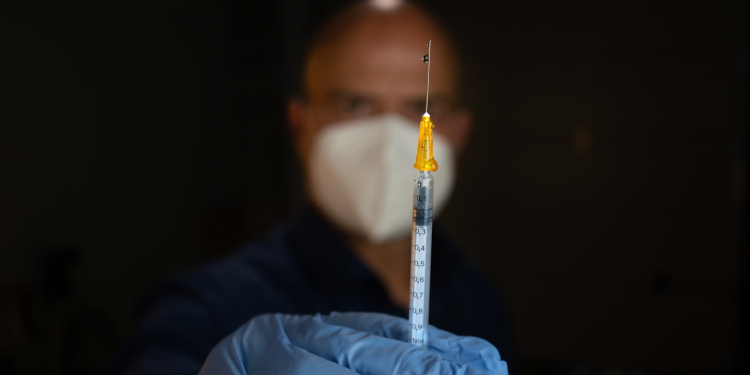The FINANCIAL — Researchers from the University of Oxford have today reported new findings from a study exploring how certain genes can help generate a strong immune response following vaccination with two commonly used COVID-19 vaccines – identifying a particular gene associated with a high antibody response.
In their findings published in Nature Medicine, the researchers found people carrying an allele (version) of an HLA gene called HLA-DQB1*06 generated a higher antibody response than those who did not.
The researchers also found that people carrying this gene (present in two out of every five people in the UK) were less likely to experience COVID-19 infection following vaccination than those who did not have it.
The HLA gene helps the immune system distinguish the body’s own proteins from foreign ones made by the likes of viruses and bacteria.
The study provides some of the first evidence of a relationship between genetic factors and the way that people’s immune systems respond to COVID-19 vaccines, say the researchers.
Julian Knight, Professor of Genomic Medicine at the University’s Wellcome Centre for Human Genetics and Chief Investigator of the study, said:
‘From this study we have evidence that our genetic makeup is one of the reasons why we may differ from each other in our immune response following COVID-19 vaccination. We found that inheriting a specific variant of an HLA gene was associated with higher antibody responses but this is only the start of the story.
‘Further work is needed to better understand the clinical significance of this specific association, and more broadly what identifying this gene variant can tell us about how effective immune responses are generated and ways to continue to improve vaccines for everyone.’
The researchers initially analysed samples from 1,190 participants who enrolled in the University of Oxford’s COVID-19 vaccine clinical trials. To provide further evidence of their findings, they also:
looked at DNA from 1,677 adults who had enrolled on Oxford’s Com-COV research programme looking at second-dose options for people who received either the Oxford-AstraZeneca or Pfizer-BioNTech vaccines as a first dose; and
examined DNA samples from children who had participated in clinical trials for the Oxford-AstraZeneca vaccine.
Researchers reported the following findings:
Individuals carrying the HLA-DQB1*06 gene recorded higher antibody responses against the COVID vaccines at 28 days following the first vaccine.
The same individuals were more likely to have a higher antibody response at all times following vaccination.
Finally, including data from an average of 494 days of follow-up, in the initial trials the researchers found that the gene allele was present in around a third of individuals reporting symptoms of COVID-19 with a positive swab test for SARS-CoV-2, compared to the allele being present in 46% of those who did not report symptoms.
Dr Alexander Mentzer, NIHR Academic Clinical Lecturer at the Wellcome Centre for Human Genetics and a lead researcher on the study, said:
‘We have seen a wide variation in how quickly people test positive for COVID-19 after vaccination. Our findings suggest that our genetic code may influence how likely this is to happen over time.
‘We hope that our findings will help us improve vaccines for the future so they not only stop us developing severe disease, but also keep us symptom-free for as long as possible.’
Dr Daniel O’Connor, University Research Lecturer at the Oxford Vaccine Group and co-author of the study, said:
‘This study shows that our genetic makeup, in addition to factors such as age and health status, impacts on how well we respond to vaccines and our subsequent risk of diseases — such as COVID-19 — which could have important implications in the design and implementation of future vaccines.’






























Discussion about this post